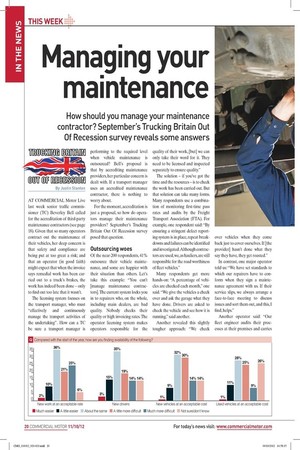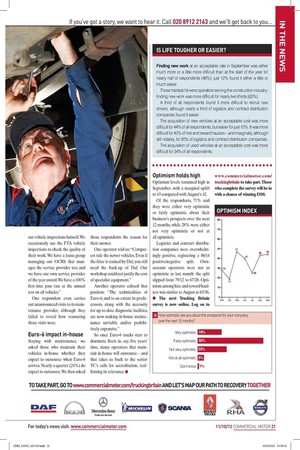Managing your maintenance
Page 16

Page 17

If you've noticed an error in this article please click here to report it so we can fix it.
How should you manage your maintenance contractor? September’s Trucking Britain Out Of Recession survey reveals some answers
AT COMMERCIAL Motor Live last week senior traffic commissioner (TC) Beverley Bell called for the accreditation of third-party maintenance contractors (see page 18). Given that so many operators contract out the maintenance of their vehicles, her deep concern is that safety and compliance are being put at too great a risk; and that an operator (in good faith) might expect that when the invoice says remedial work has been carried out to a truck’s brakes, the work has indeed been done – only to find out too late that it wasn’t.
The licensing system focuses on the transport manager, who must “effectively and continuously manage the transport activities of the undertaking” . How can a TC be sure a transport manager is performing to the required level when vehicle maintenance is outsourced? Bell’s proposal is that by accrediting maintenance providers, her particular concern is dealt with. If a transport manager uses an accredited maintenance contractor, there is nothing to worry about.
For the moment, accreditation is just a proposal, so how do operators manage their maintenance providers? September’s Trucking Britain Out Of Recession survey posed that question.
Outsourcing woes
Of the near-200 respondents, 41% outsource their vehicle maintenance, and some are happier with their situation than others. Let’s take this example: “You can’t [manage maintenance contractors]. The current system locks you in to repairers who, on the whole, including main dealers, are bad quality. Nobody checks their quality or high invoicing rates. The operator licensing system makes operators responsible for the quality of their work, [but] we can only take their word for it. They need to be licensed and inspected separately to ensure quality.” The solution – if you’ve got the time and the resources – is to check the work has been carried out. But that solution can take many forms. Many respondents use a combination of monitoring first-time pass rates and audits by the Freight Transport Association (FTA). For example, one respondent said: “By ensuring a stringent defect reporting system is in place, repeat breakdowns and failures can be identified and investigated. Although contractors are used, we, as hauliers, are still responsible for the road worthiness of fleet vehicles.” Many respondents get more hands-on: “A percentage of vehicles are checked each month,” one said. “We give the vehicles a check over and ask the garage what they have done. Drivers are asked to check the vehicle and see how it is running,” said another.
Another revealed this slightly tougher approach: “We check over vehicles when they come back just to cover ourselves. If [the provider] hasn’t done what they say they have, they get roasted.” In contrast, one major operator told us: “We have set standards to which our repairers have to conform when they sign a maintenance agreement with us. If their service slips, we always arrange a face-to-face meeting to discuss issues and sort them out, and this, I find, helps.” Another operator said: “Our fleet engineer audits their processes at their premises and carries out vehicle inspections himself. We occasionally use the FTA vehicle inspections to check the quality of their work. We have a focus group managing our OCRS that manages the service provider too, and we have our own service provider of the year award. We have a 100% first-time pass rate at the annual test on all vehicles.” One respondent even carries out unannounced visits to its maintenance provider, although they failed to reveal how reassuring those visits were.
Euro-6 impact in-house
Staying with maintenance, we asked those who maintain their vehicles in-house whether they expect to outsource when Euro-6 arrives. Nearly a quarter (24%) do expect to outsource. We then asked those respondents the reason for their answer.
One operator told us: “Computers rule the newer vehicles. Even if the fitter is trained by Daf, you still need the back-up of Daf. Our workshop could not justify the cost of specialist equipment.” Another operator echoed that position: “The technicalities of Euro-6, and to an extent its predecessors, along with the necessity for up-to-date diagnostic facilities, are now making in-house maintenance unviable and/or prohibitively expensive.” So once Euro-6 trucks start to dominate fleets in, say, five years’ time, many operators that maintain in-house will outsource – and that takes us back to the senior TC’s calls for accreditation, reaffirming its relevance. ■











































